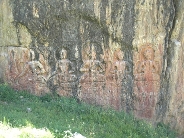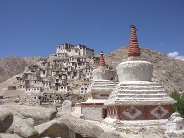
New courses Buddhist Studies by dr. Helmut Tauscher
In the Spring semester of 2017, two courses will be offered by the Numata Visiting Professor of Buddhist Studies, Dr. Helmut Tauscher. One is oriented at the BA level (starting February 23), the other at the MA level (starting February 20).
The BA course is Buddhism Past and Present in the Western Himalaya, and the MA course Introduction to the Madhyamaka School of Philosophy. The courses are open to all. Students who wish academic credit for the course (5 EC in each case), should register for the course on uSis. Registration is open now! The deadline for registration is 13 February 2017. Those who wish simply to attend need not register, and may simply attend the lectures. For more information, please contact prof. dr. J.A. Silk.

Information on the courses
Buddhism Past and Present in the Western Himalaya (BA course)
"Buddhism" in the western Himalaya it is not doctrinally distinct from Tibetan Buddhism in general; it IS Tibetan Buddhism. Therefore, the first part of this course will deal with characteristic features of this variety of Buddhism, laying some emphasis of its syncretistic aspects and the various "schools" of Tibetan Buddhism.
The term "past" in the title of the course refers to history. Tibetan history in general is closely connected with the history of Buddhism, and the western Himalayan regions have been in contact with Buddhism ever since the 2nd cent. AD. The so-called "later diffusion" (sphyi dar) of Buddhism in Tibet (from the 10th cent. onwards) had its starting point in western Tibet. A complete treatment would basically imply a course the history of these regions from the 2nd to the 20th cent. For obvious reasons our coverage will, therefore, be selective.
In the absence of obvious doctrinal differences, "present", in turn, implies primarily anthropological aspects, rituals, festivals and the like, the coverage of which will likewise be selective. A rough historical survey of the area called, in Tibetan mNga’ ris, the Buddhism represented in monastic institutions and in everyday life in the regions of Ladakh, Kinnaur, and Lahul-Spiti will therefore form the core of the course. The instructor, Dr. Tauscher, has worked, researched and traveled in this region for many years; the course lectures will be illustrated by his own photographs of the region.

Introduction to the Madhyamaka School of Philosophy (MA course)
This seminar will begin with a short and very general introduction to the central ideas and concepts of Madhyamaka philosophy, including the doctrine of the two truths/realities (satyadyaya), emptiness (śūnyata), dependent origination (partītyasamutpāda) and its argumentative methods, prasaṅga and svatantra. On the basis of these, Madhyamaka was sub-divided into Prāsaṅgika and Svātantrika in 11th cent. Tibet. This will be followed by a short introduction to the life and work of Tsong kha pa Blo bzang grags pa (1357-1419), one of Tibet's most influential masters.
The main part of the seminar will consist of reading passages from Tsong kha pa's Madhyamaka works. As this course is meant to be an "introduction to Madhyamaka", we will start with reading his commentary on the introductory verse of Nāgārjuna's Mūlamadhyamakakātikā in the rTsa she ṭik chen Rigs pa’i rgya mtsho. In Indian philosophical treatises, the introductory verse often provides something like a summary of the crucial points of the work. So, Tsong kha pa's extensive commentary on this verse can be seen as an introduction to Madhyamaka from the Tibetan point of view.
If time allows, we will read from the Lam rim chen mo a small part of the chapter on defining the "object of negation" (dgag bya), i.e., everything that is opposed to absolute reality and its realisation. For Tsong kha pa, the correct definition of the dgag bya is of crucial importance in Madhyamaka exegetics, as it helps to avoid the extremes of nihilism and substantialism.
The reading will be primarily in Tibetan, but for those who are not experienced in reading genuine Tibetan philosophical texts, English translations will be available.

Besides the BA and MA-courses, on 12 April 2017 there will be held a Public Lecture: “In search of Buddhist Western Tibet: Palaces, monasteries and manuscripts in Lahul, Ladakh and Zangskar”.
Time: 19:00-21:00
Venue: Lipsius 019
Registration for the Public Lecture is not needed!
Prof. (ret.) Dr. Helmut Tauscher served for many years as Director of the Institute for Tibetan and Buddhist Studies and Deputy Director of the Department for South Asian, Tibetan and Buddhist Studies at the University of Vienna, where he earned his PhD in Tibetan and Buddhist Studies (1981). A specialist in Tibetan Buddhism, he has researched and travelled extensively in Lahaul-Spiti and Kinnaur, Himachal Pradesh, and Ladakh / Zanskar, Jammu & Kashimr, India.
